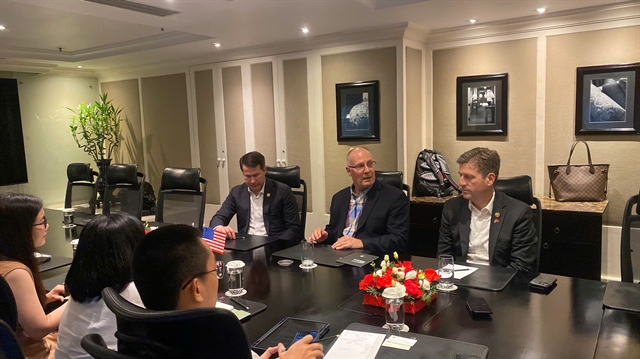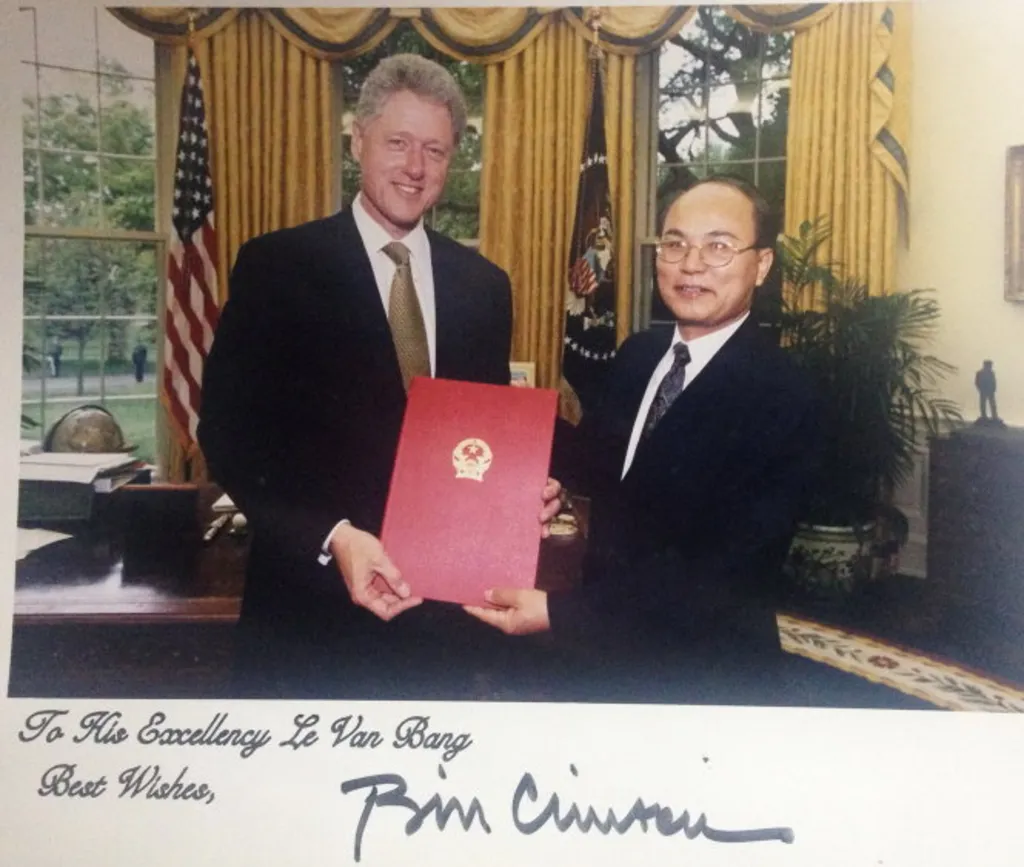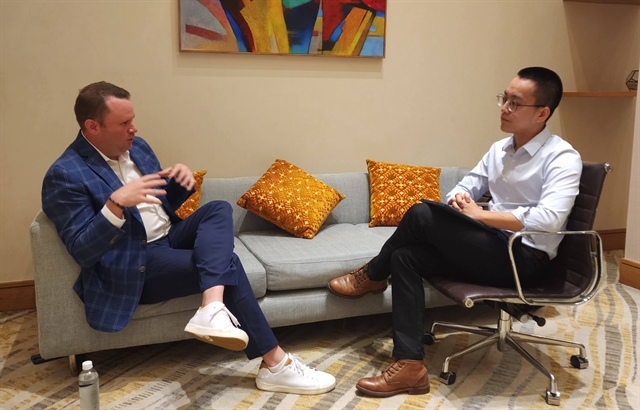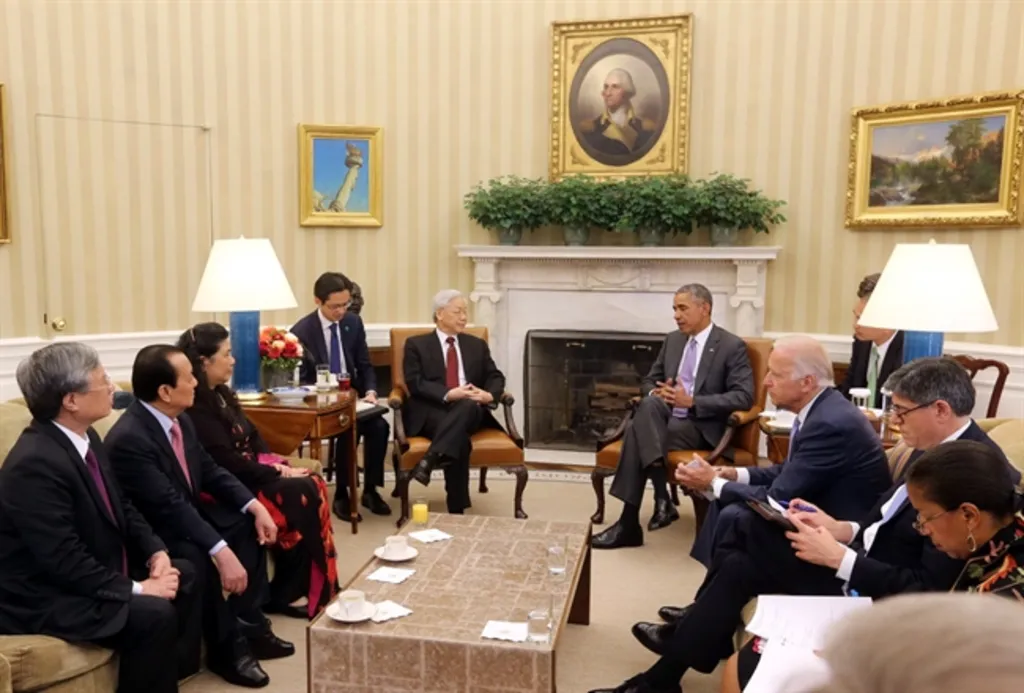 Politics & Law
Politics & Law

 |
| US President Bill Clinton receives the credentials of Ambassador Lê Văn Bàng, the first Vietnamese ambassador after normalisation of ties, in the White House on May 14, 1997. Photo from the Ambassador |
Việt Nam News talks to Scott Nemeth, assistant director for the Global Leadership Programme at Arizona State University’s McCain Institute, on 30 years of normalisation of relations between Việt Nam and the United States, reflecting on the pivotal roles of the late Senator John McCain in advancing reconciliation and current trajectory of bilateral ties.
As we celebrate the 30th anniversary of diplomatic relations between Việt Nam and the United States this year, can you tell us about the important advocacy efforts in shifting public and political opinion towards reconciliation with Việt Nam?
In the 1960s and 1970s, there was a lot of divide over the US-Việt Nam war. You had people who thought that it was not in the interests of the US, while there were so many questions going on domestically about civil rights, the economy, and greater political questions.
So it was a deeply unpopular war. And it took a lot of political capital for both Senator John McCain and Senator John Kerry to be able to get political will within the US Congress and with President Bill Clinton at the time, to be able to believe in the idea that it was in the national interest to build a strong relationship between both sides.
It took a long time because people wanted to forget about Việt Nam. It was a dark spot in the memory of many Americans and many politicians. When the topic resurfaced in the 1990s, there was an opportunity to open up a path to have normalised relations and to be able to settle the question of Việt Nam once and for all.
It took a lot of political manoeuvring for both senators to be able to do that. There were a few questions that stuck in the back of Americans' minds, mostly to do with prisoners of war and those missing in action (MIA). Some thought that the MIAs were being held in Việt Nam, and in order to be able to stamp the idea of normalised relations and move forward, those questions had to be answered.
Both senators, as well as Senator Bob Kerrey, took the time to investigate whether or not there were still MIA Americans here in Việt Nam, and once they were able to assure the American public that that was not the case, then President Clinton felt comfortable moving forward.
Senators McCain and Kerry are from different political parties; how did they manage to build this bipartisan consensus on Việt Nam?
Both Senators served in the war, and when they returned home, they had very different ideas of the war: Senator McCain still believed that it was a just cause that the US was fighting in the best interest, while Senator Kerry was much more on the idea of peace. So, at the beginning, you had two very different stances between the senators.
But once they got to the US Senate a couple of years later, both of them were known for working in a bipartisan fashion and working in the best interest of the US.
Senator McCain's legacy, what folks know about him in the US, is that he was always willing to put country over party, and when it came to the question of normalisation with Việt Nam, he believed that it was in the best interests of the US.
And when the senator believed that something was important for the country, he would be willing to work with Democrats or independents or his fellow Republicans, and he knew that it was critical to have bipartisan support for this. He found a willing and supportive partner in Senator Kerry, and they were able to work within their parties to build that support.
 |
| Scott Nemeth (left), assistant director for the Global Leadership Programme at the McCain Institute. VNS Photo |
In US President Joe Biden's last speech at the United Nations, he said the upgrade of ties between the US and Việt Nam was one of the highlights of his career. And General Secretary Tô Lâm [of the Việt Nam Communist Party] said Việt Nam-US relationship could serve as a model of post-conflict reconciliation for other parts of the world. Does that sound fair to you?
The idea of two countries, once at war with each other in a brutal way, coming together and working together is unique.
Today we see so many conflicts around the world. There's conflict on every continent. And there are far fewer success stories of two countries coming together and working together than there are of negative stories.
When President Biden visited Việt Nam a couple of years ago, it stood out to him, and it stood out to the American people as a success story. It is in the interests of the US to have a strong partnership with Việt Nam. It's in our economic and security interests in the region and globally.
The US has benefited strongly from the relationship with Việt Nam, and President Biden understood that, as did some of his predecessors who previously visited. And for the Vietnamese, it has done incredible things for the economy, and it has opened up plenty of pathways for education and for economic prosperity, in a way that wasn't previously realised before 1995.
How do you view current Việt Nam-US relations, especially with the decision to skip a stage to forge a Comprehensive Strategic Partnership in the spirit of setting aside the past and looking towards the future?
Việt Nam's decision to elevate us to the highest partnership level symbolises just how important these last 30 years have been. And as we celebrate 30 years of normalised relations, we move into an opportunity to continue to build on this relationship, both through cultural exchange, economic partnership and security partnerships.
That raising of the partnership level is incredibly symbolic, it shows that this relationship is a two-way street, and that it benefits both the US and Việt Nam.
It's not usual for every sitting US President to visit a particular country, and for the last couple of decades, every US president has come to Việt Nam, and that's incredibly important in symbolising how seriously the US takes this relationship. And for the Vietnamese Government to offer us that highest level of partnership shows that this relationship is viewed equally in its importance and its benefit.
Could the recent tariff policy of the Donald Trump administration affect the trajectory of bilateral ties, given that it could be harmful for Việt Nam's prosperity?
The last couple of years have presented great challenges all around the world, especially here in the Indo-Pacific region, you have this new era of great power competition.
Prior to the current US administration, questions were beginning to arise around the world about how we will all function in the next couple of years and decades. Foreign policy and geopolitics have been changing over the last couple of years, and international alliances and partnerships have been put under a stress test.
Over the last couple of months, with the new administration, we're seeing a new brand of foreign policy from the US, and one that I don't think has been decided fully.
I think that over the next couple of months and even a couple of years, we'll have a better understanding of what this administration's foreign policy is.
These first couple of months have been difficult for the international community. The tariff strategy has potentially eroded some trust, not just with countries like Việt Nam, but with long-standing allies of the US such as the United Kingdom, the European Union and others. This is a period of both confusion and uncertainty.
However, it is in the national interest of the US, from an economic and security perspective, to be fully engaged with Việt Nam and to have a well-rounded and beneficial partnership with it.
I believe that over the next couple of months, the relationship will resolve itself. I do feel strongly that given the US interest in the region, they will work closely with their Vietnamese partners, and some of the messaging from the Department of Defense and the Department of State towards Việt Nam has been consistent with that notion that it remains a strategic and critical partner for the US.
 |
| Party General Secretary Nguyễn Phú Trọng holds talks with US President Barack Obama at the White House in Washington DC in 2015. This is the first time the leader of the Communist Party of Việt Nam has visited the US. — VNA/VNS Photo Trí Dũng |
You said that it is in the best interests of the US to fully engage with Việt Nam. How does that line up with opinions that the US is becoming more isolationist?
In Washington, I think it's the mainstream thought. I haven't come across anyone who is an expert or a diplomat that says otherwise.
For many, many years now, given the normalisation, and given this incredible road of peace and reconciliation between our two countries, Americans by and large view Việt Nam as a strong partner, and they look favourably on it. Popular thinking and expert thinking all align with this.
My personal view is that in their new foreign policy, at the end of the day, the current US administration wants to work towards a world in which we are still engaged strongly in this region and with Việt Nam.
It's certain that the US is in a new era of foreign policy, and one in which this administration is stepping back from the global stage. Our engagement will look new with partners like Việt Nam, but I don't expect us to fully step away.
For example, despite all the cuts with the US Agency for International Development and the State Department, we're still committing vital resources to demining and other activities here in Việt Nam to help address some of the negative legacies of the war.
That’s incredibly symbolic: while we are taking a step back, we are still devoting critical resources where we need to. Can more be done? Most certainly yes, and I think that more will be done over the next couple of months and years.
We're in a bit of a chaotic moment in the US, and we certainly have questions about what the future holds when it comes to our role on the international stage. But the US always answers its call to step up when needed. I have no doubt that's the resolve of the American people. VNS
The McCain Institute is a Washington-based non-partisan think tank founded by Senator John McCain and family in 2012.Its flagship programme, McCain Global Leaders, brings future leaders from many countries to Việt Nam every year to highlight the story of normalisation of peace and reconciliation, as well as McCain's legacy here in this country.




